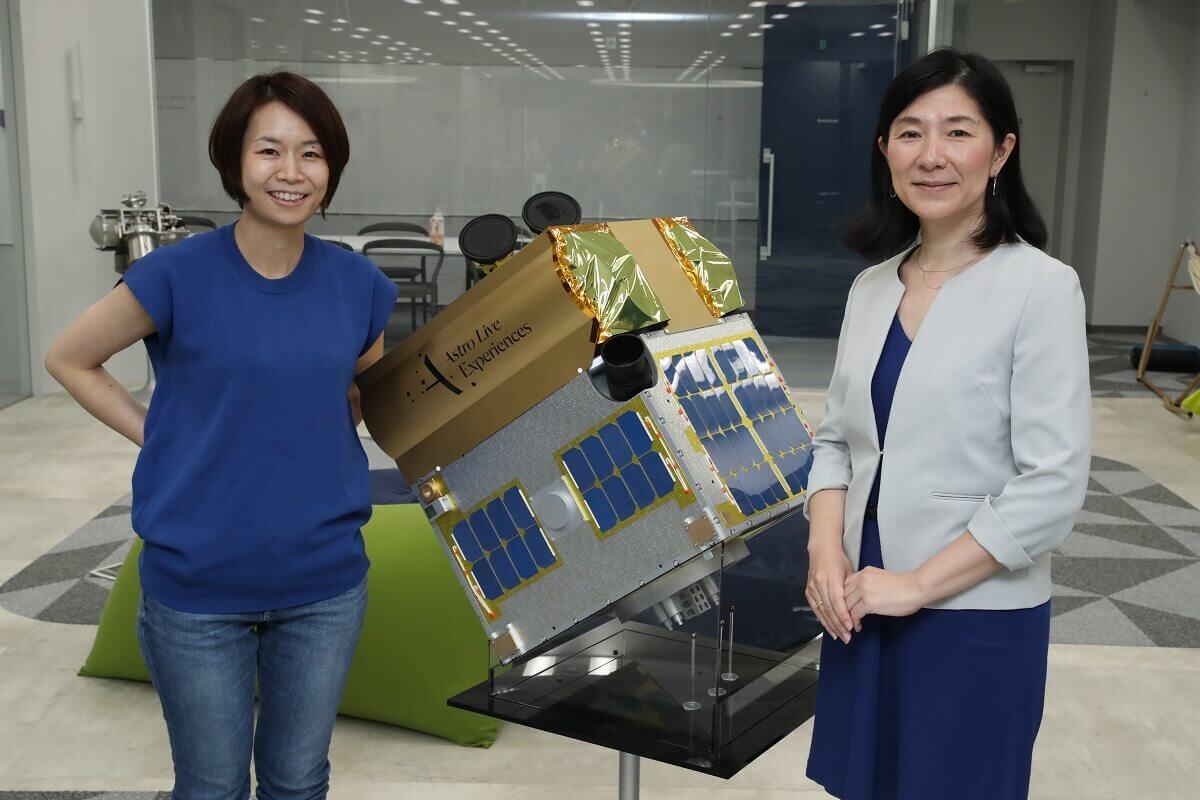
A look at two Japanese companies adapting to change.
AMs. Lena Okajima, CEO of ALE Co. Ltd. (left) and Ms. Miho Norinaga of MTC
ALE Co. Ltd. (Minato-ku, Tokyo) is a space startup company that was started in 2011 to create the world's first man-made shooting star. Metal Technology Co. Ltd. (Nakano-ku, Tokyo) founded in 1960 is an engineering company with expertise in metal processing. At first glance, these two companies would seem to have little in common, but in fact, they are in partnership together to make a difference. Metal Technology Co. Ltd. (MTC) is supplying additively manufactured components for ALE's satellites.
ALE`s founder and CEO, Ms. Lena Okajima and MTC`s Deputy General Manager of the Sales Division, Ms. Miho Norinaga, met recently. The discussion that followed touched on the alliance between the two companies, the culture of Japanese companies, and the future of the business. For our readers it offers an insight into how companies are changing or adapting to the uncertain economic climate and coping with the Corona virus pandemic.
An instant connection leading to a partnership
Q: The initial contact with ALE was through an engineer of ALE visiting MTC`s website, wasn`t it?
Miho: That's correct. We received an inquiry, and in fact the whole initial stages progressed rapidly after the inquiry. We received the order three days after the initial meeting. I had been aware of ALE for some time, and our President had also Read an article about Ms. Okajima saying that “We need to do this kind of dream job, too.” So there was an instant connection.
Q: What was the reason to choose MTC for ALE`s project?
Lena: Our engineers were looking for a company whose advanced technology could meet our project demands and we found, MTC. To begin with, there are very few companies that have the expertise in the technology we want to utilize. For example, in the case of automotive parts, orders are placed in huge lots utilizing technology and automation, but our satellites require a high level of specialized technology even though the volume required is small. As a consequence, it isn`t something they want to tackle. Also, personally I desired a company that would see our project as an “interesting” project.
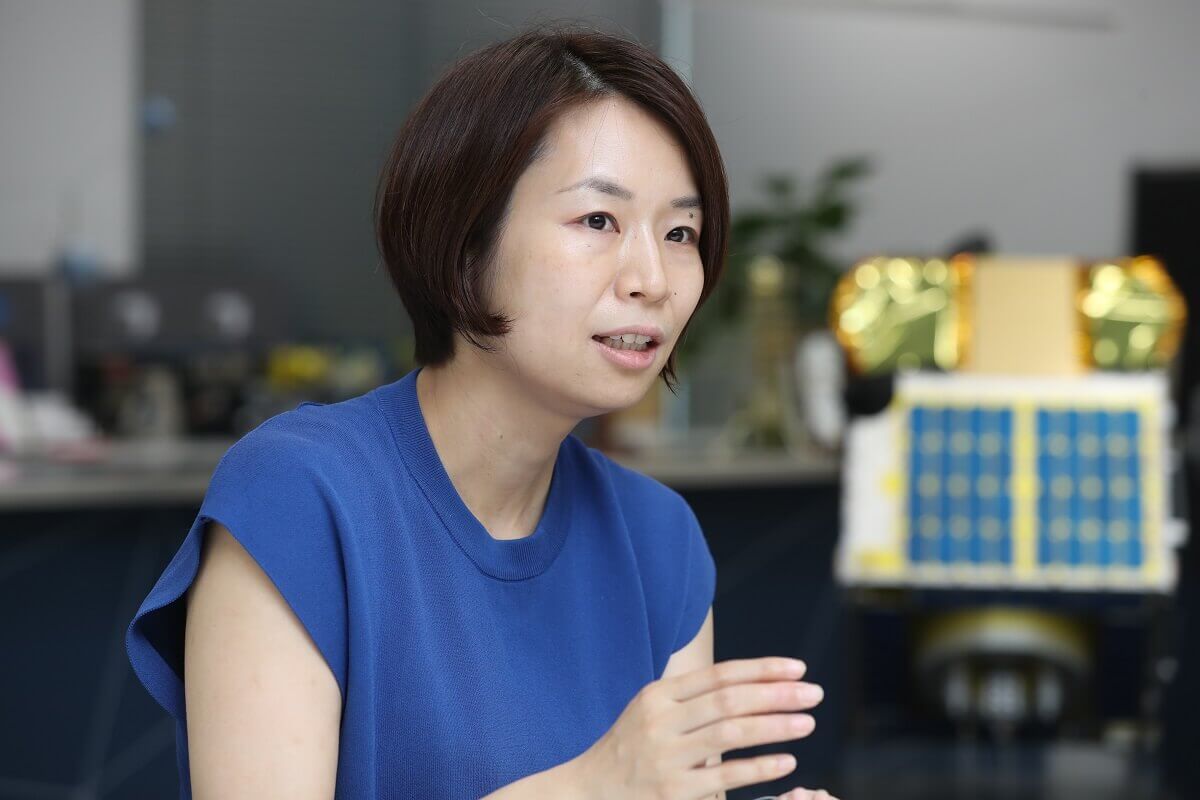
Ms. Lena Okajima of ALE
Q: MTC was able to meet these demands and desire for a specialized approach, weren`t you?
Miho: Originally, Aerospace is one of MTC`s three business pillars, so we have experience with similar customer needs. Also, we have been involved in work with the Japan Aerospace Exploration Agency (JAXA), so MTC could be comfortable with the scope of the project.
Q: What do you expect from the Japanese manufacturing industry in the future?
Lena: We would like to continue making artificial satellites in Japan. A device that emits shooting stars requires considerable accuracy. It may not have been possible to take this overseas and make it. With that in mind, I hope that the technology of the Japanese manufacturing industry will not die. When we considered this, we feel that MTC’s manufacturing technology could be maintained and reliable for the future.
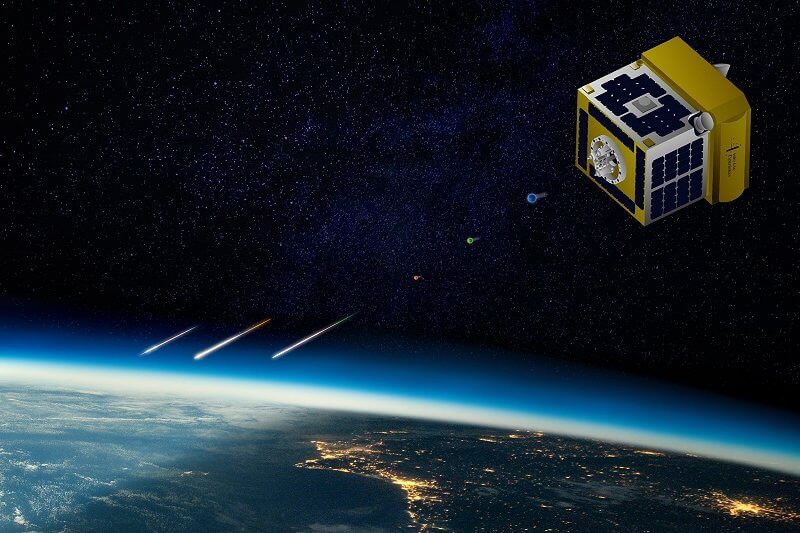
Particles emitted from a satellite to create man-made shooting stars (image, provided by ALE)
Miho: The way of working for Japanese companies compared to foreign companies is different. It seems that Japanese companies will proceed carefully after exchanging a considerable amount of information and consultation in advance. In this respect, the speed of ALE is amazing. I hope I can use ALE`s way of working within our own.
Q. Unfortunately the world’s first man-made shooting star launch has been postponed to early 2023.
Lena: That’s right. We will try again, and we are fixing the satellite's defects.
Miho: I was really looking forward to it because my
hometown is Setouchi.
(ALE`s first event was to be held in this area of
Japan)
Lena: Where are you from?
Miho: I am from Kagawa prefecture
Lena: I am from Tottori, which is close. I heard that you used to work at the Kagawa Prefectural Office.
Miho: Yes, I joined the prefectural office at first, and then I worked for a consulting company before my current position.
Lena: So, did you say that you were overseeing local manufacturing when you were in the prefectural office?
Miho: I worked in various departments. For example, the International Exchange and Tourism section. My last position was in the Tokyo Office, where I oversaw Tourism and Product Promotion.
Lena: So, you went from the prefectural government all the way through to consulting! That is wonderful, you certainly have taken on several challenges in your career.
Miho: I didn’t imagine this when I joined the prefectural government. While I was working there, I came to feel that work was motivating. When I worked in Tokyo, I met several people doing a a variety of things, and I was inspired by this. I worked to introduce Kagawa to many people, but I felt that wanted to achieve more, so I to the challenge to change my job. I wasn’t a consultant like you may typically imagine. I was selling products from manufacturing companies to overseas and making appointments with buyers. At that time, I had an increasing feeling that I wanted to take more responsibility for the work I did. Not to just help and support but to do more. Then MTC offered me this current position.
Japanese companies changing little by little
Lena: Most Japanese companies still keep the male-dominated societal stance, don't they? When I think about it from my personal position, I think MTC`s president is very open-minded and forward-thinking.
Miho: In my previous consulting business position I
visited overseas customers with Japanese clients. Half of the overseas members
were women, and yet all of the Japanese side were men and generally a little
older. The foreign customers were quite down to earth and relaxed, for example,
with coffee they would say “It’s right over there, so help yourself". I noticed
at times the Japanese team would be embarrassed and unsure what to do.
Likewise, when I came to MTC I noticed that only the women wore uniforms. When I
inquired why only the women wore uniforms, none of them could give a clear
reason. Eventually, this was changed, and the uniforms were dropped from the
head office. At first, some people said that they could continue wearing the
uniforms, but now it seems that head office staff enjoy wearing their choice of
professional clothing. I think that this has been the norm until now because the
company is male-dominated as is the technology related companies. I think and
hope that’s slowly changing.
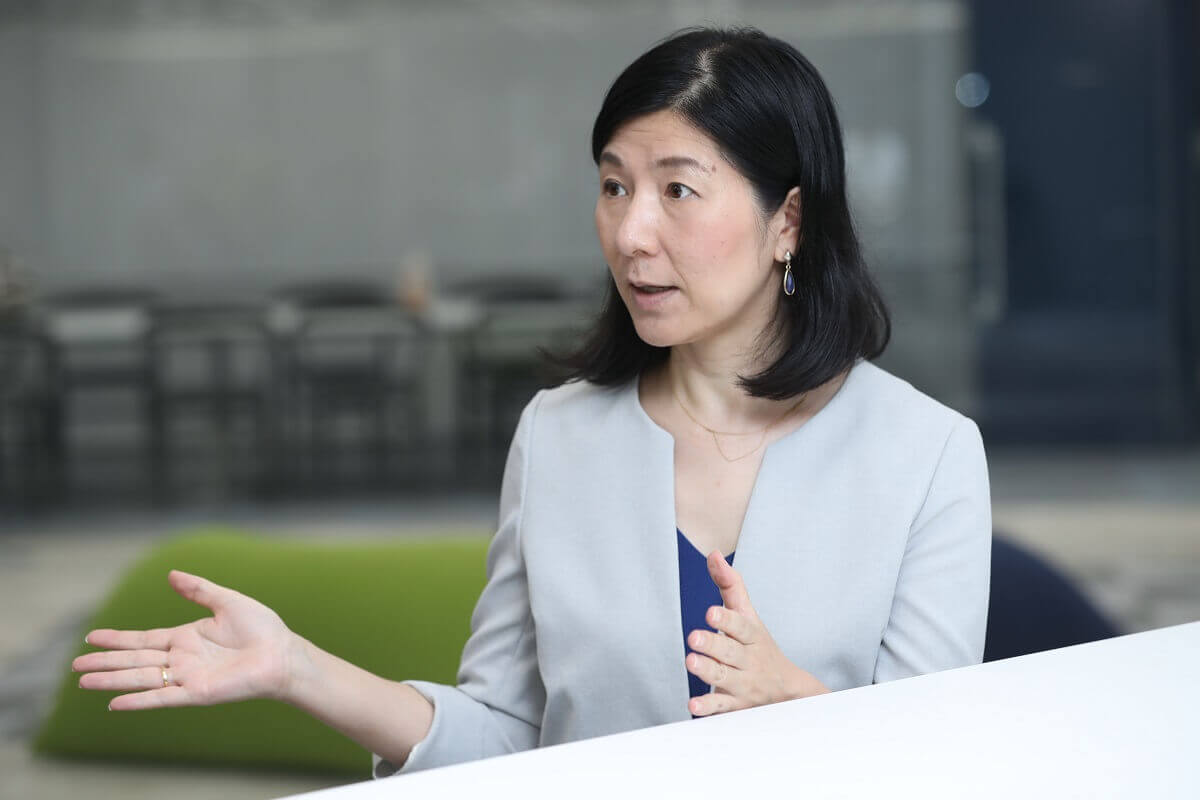
Ms. Norinaga at MTC
Q: Ms. Okajima's career is also unique, as you started your own business while you were still in school and worked for a major securities company before starting ALE. Do you have any advice for students regarding women’s career paths?
Lena: In the past, I used to tell female students that I would recommend foreign companies, not Japanese companies (laughs). Now it is up to them to find a Japanese company that will give them a role and a place to work, like MTC.
Q: It’s a gamble, isn’t it? (laughs)
Miho: I agree with you (laughs).
Lena: Or you can just start your own business!
Q: Currently, institutional reforms are underway on the corporate side, such as promoting the acquisition of childcare leave for men, but gender equality should make it easier for men to live too.
Lena: I feel that men still have this feeling that they are the “pillar-of-the-family” fantasy, and it seems to be difficult for them to adapt to a different role. I believe that gender equality does not mean that women should have special rights, more that it means that we live comfortably with each other, making the most of our individual strengths without being limited by gender. I do not want my son to have to live in an unreasonable and demanding environment when he grows up. I hope we can create a society that is easy for both genders to live peacefully.
What is sustainable manufacturing?
Q: I heard that ALE is to be involved in supporting climate change, isn't it?
Lena: We're thinking of obtaining data on the middle atmosphere in the 50-kilometer to 100-kilometer range, within the process of launching the satellites and shooting man-made stars. If data on the middle atmosphere can be obtained, it will be useful for predicting extreme weather events and clarifying the mechanisms of climate change.
Q: I see, on the other hand, I understand that MTC is focusing on Sustainable Development Goals (SDGs) in manufacturing. I think that this trend, on reducing waste materials, is likely to accelerate in the future.
Miho: In the aerospace world there are standards to measure usage of materials in making parts. We specialize in hot isostatic pressing (HIP), which is used to sinter powder metal at high pressure and temperature. We also utilize the use of Additive Manufacturing. Both of these technologies can improve the mechanical properties of the products and at the same time reduce waste and cost. For example, in the case of airplanes, we can support the construction of materials to help make the plane lighter and improve the performance. We think because of this we can adapt and take advantage of this vital trend.
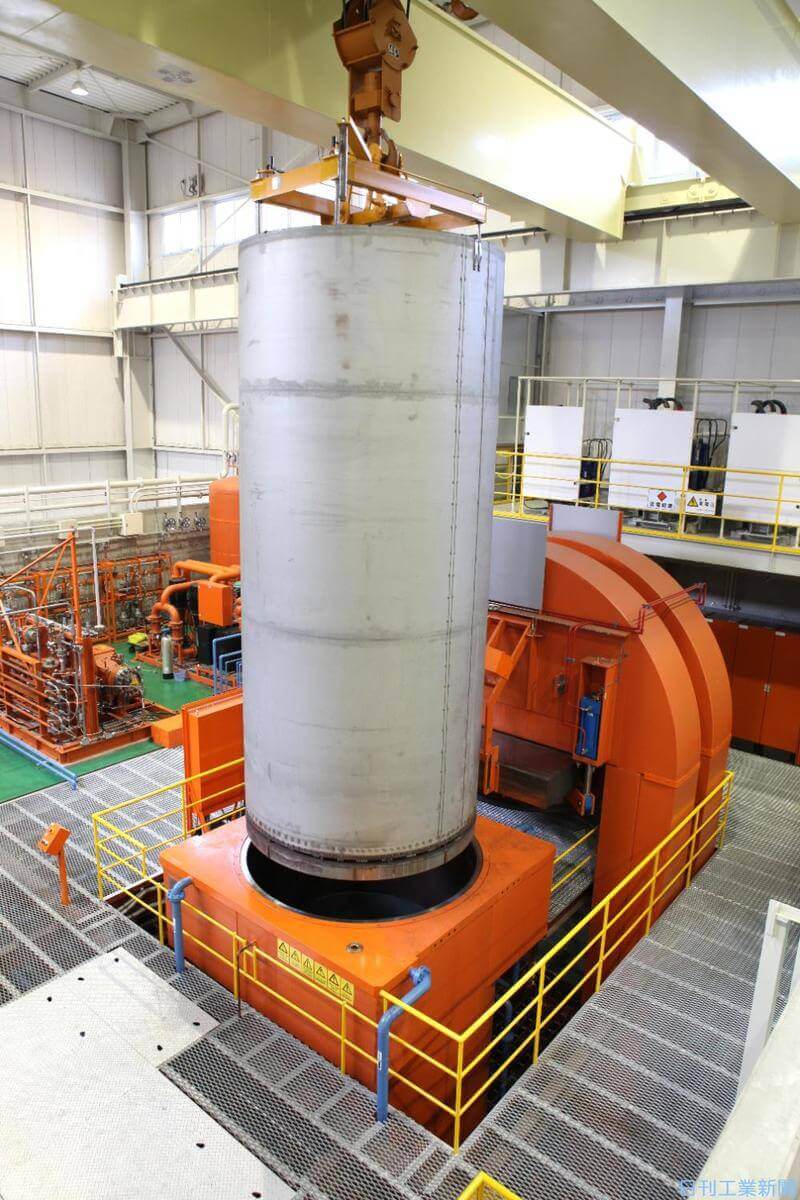
MTC`s Giga HIP equipment
We have been involved in several space-related projects, such as rockets for JAXA, and the “XMASS” project. The XMASS was a project to directly observe dark matter, which is unknown particles flying from space, which has already been completed. MTC wants to work for a better world and in achieving dreams.
Time to be united as a company in the wake of the Corona Virus!
Q: Due to the spread of the Covid-19 there is a need to change the conventional way to work. How are you responding?
Lena: We have about 30 employees right now, but I’d like to use
this period to make our current members united. It is stated that there are
hurdles for start-up businesses, such as the 30-employee wall and the
100-employee wall. So, for the past few years, I've been trying to create an
untied company with a collective strength. If we can achieve this, we will be
able to expand the business smoothly in the future too.
Since the chances
of meeting with employees has decreased considerably, we are proactively
creating opportunities to have one-on-one conversations with them online. I
would like to note, our engineers do come to work, and they were able to work on
the computer at the design stage, but it is challenging when we get to the
assembly stage.
Q: In April, MTC acquired a Swedish company. Even though the domestic market is shrinking, is it inevitable to look towards overseas markets even in such a situation?
Miho: The acquisition agreement was completed one week before Europe was thrown into the pandemic and everything changed. The president of MTC has the approach that “if you don't challenge, you won't grow.” The adoption of the HIP equipment and process was also an example of a wise decision on the part of the management at that time.
Lena: Is the decision to work in that field intuitive?
Miho: I think the president was actually thinking
about a variety of paths, but from my perspective as an amateur compared to him,
it seems intuitive (laughs). When he was young, he used to consider about many
elements. When he was asked to tinker with equipment, he used to consider and
think deeply about how he could approach and understand it. Then once he thought
about how he could do it he then found a way to do it. I guess, in that sense,
he is always searching for many things.
Most of us work at home at the head
office, but it's difficult for us to do the same at the Plants. We have seven
Plants in Japan, so it means we also have seven Plant managers too. I often
utilize “zoom” at certain times so we can chat altogether. Sometimes I've been
struggling alone, but when we talk together I can sometimes come up with ideas
for improvement.
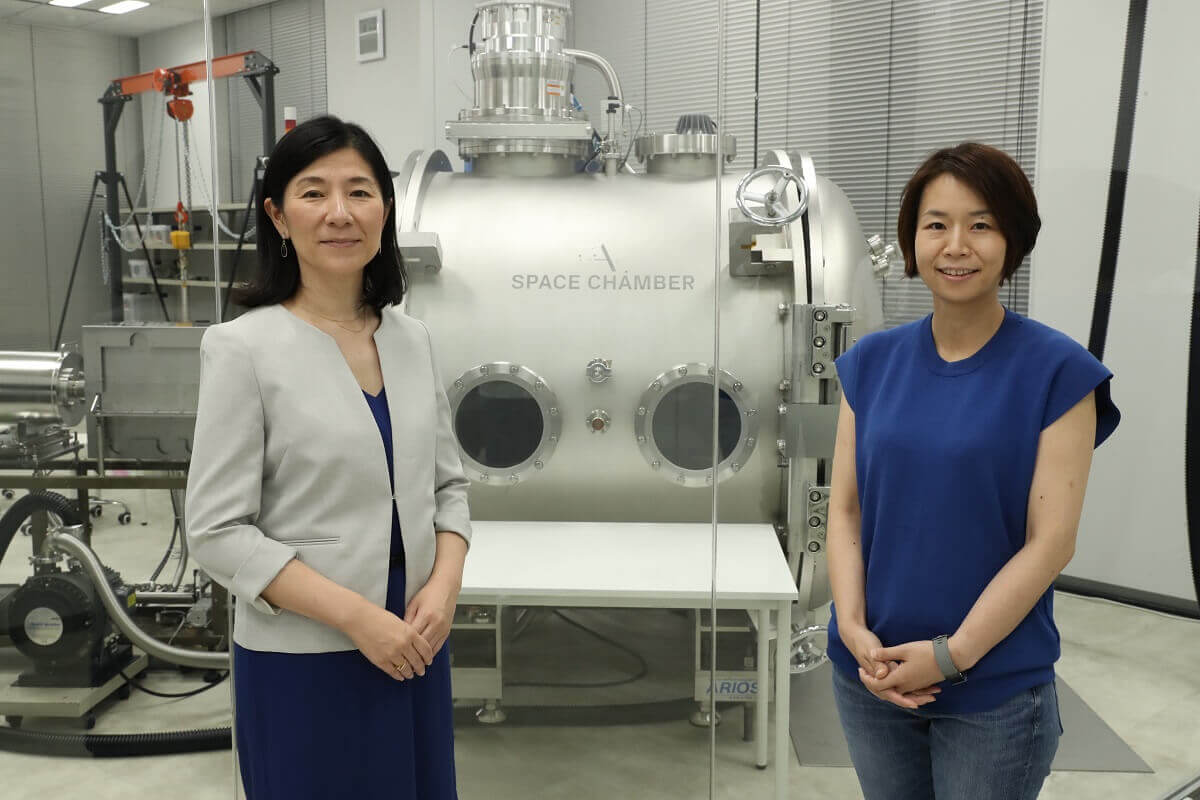
Ms. Lena Okajima (right) of ALE and Ms. Norinaga at MTC in front of the vacuum chamber
It's business, but it's fun to dream!
Q: Ms. Okajima, you decided to start your business after seeing the 2001 Leonid meteor shower, didn't you? That was at dawn, but if they were man-made shooting stars, you could show them at a time when children could also see them. It would be interesting to have an event where everyone could look up at the sky together.
Lena: I don't know if we will be able to achieve that, but we do receive lots of interesting ideas and thoughts. For example, there are requests to use the shooting man-made stars to stop fighting in a war zone, or to celebrate a child's birthday. It makes me happy to know that everyone is getting involved in thinking various thoughts and feelings about the project.
Q: It's just a business, but it's a fun story, isn't it?
Miho: MTC`s president often says that. Everyone talks about their dreams and that’s it, but ALE has an amazing ability to turn it into a business that can be continued well.
Lena: I haven't done it yet (laughs).
Miho: I’m cheering for you.
Lena: I think space travel will be normal for humans in the future. It would be great if we could play a part in that. We would like to thank MTC for your support.
Q: How was today for you both?
Miho: I tried to imagine what kind of person Ms. Okajima was on my way to here, and I can say it was much more fun than I had imagined.
Lena: Until just before the interview, I didn't even realize that the person would be a woman (laughs). I think it’s just my prejudice, but as your company is a manufacturing company, I thought you would be a man (laughs). I was able to be curious and asked a lot of questions which was great. There's a good Udon noodle restaurant near my office. Let's go eat Udon next time if it’s OK with you!
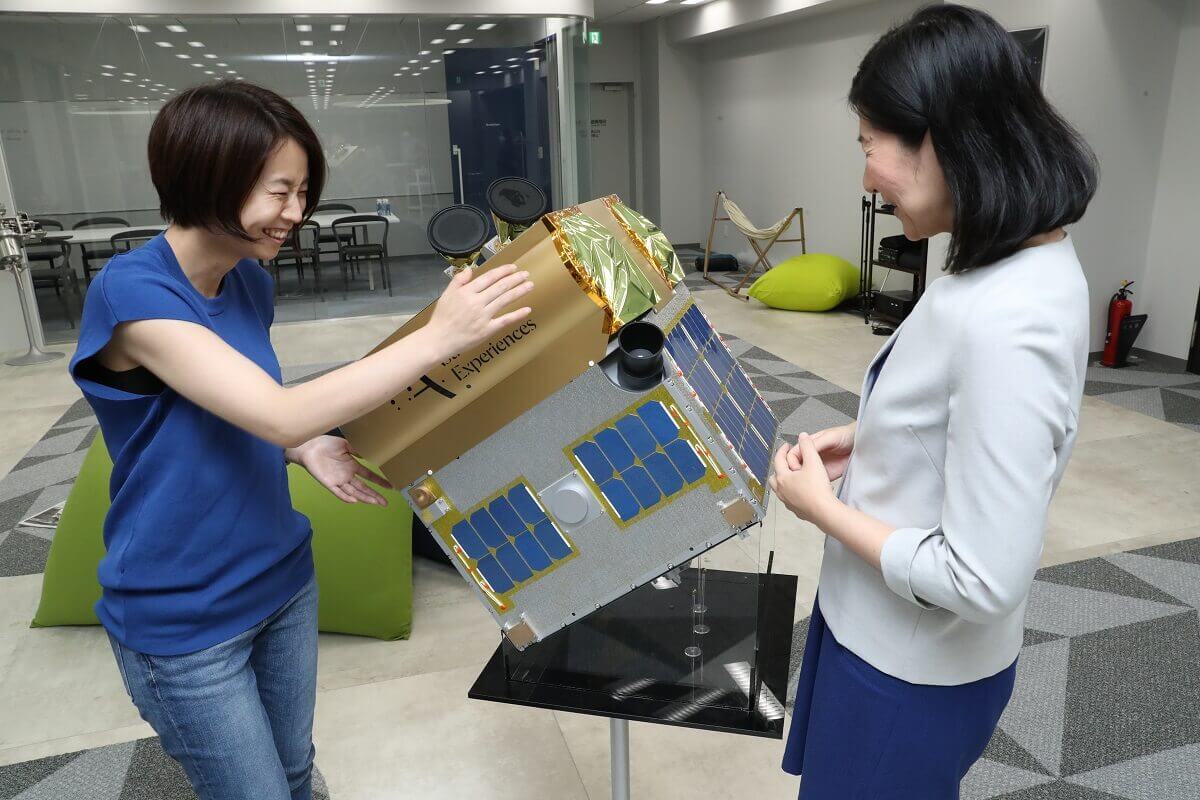
Ms. Lena Okajima of ALE (left) and Ms. Norinaga holding a model of a satellite
Lena Okajima. Born in Tottori prefecture. Received a PhD (Science) from the Department of Astronomy, Graduate School of Science, the University of Tokyo. After graduating, she joined Goldman Sachs Securities. Her research on man-made shooting stars started in 2009, and ALE Co., Ltd. was established in September 2011. Currently she is the President / CEO. The company’s mission is to “connect science to society and make the universe a cultural sphere.” Through the space entertainment business and the utilization of middle-level atmospheric data, ALE aims to contribute to the sustainable development of science and humankind.
Miho Norinaga. Born in Kagawa prefecture. After graduating from the Department of Sociology, Faculty of Human Sciences, Osaka University, she joined the Kagawa Prefectural Office. After leaving the agency after working in the International Exchange and Tourism Promotion, she worked in Mitsubishi UFJ Research and Consulting, where she was involved in supporting the overseas expansion of Japanese companies. In 2016, she joined Metal Technology Co. Ltd., where she served as Deputy General Manager of the Sales Division, mainly overseeing overseas sales and related operations. She is interested in diversity and inclusion, and is working to develop new markets in a work environment that takes advantage of diversity.
Interviewer / Quote source: Nikkan Kogyo Shimbun Co., Ltd. New Switch



